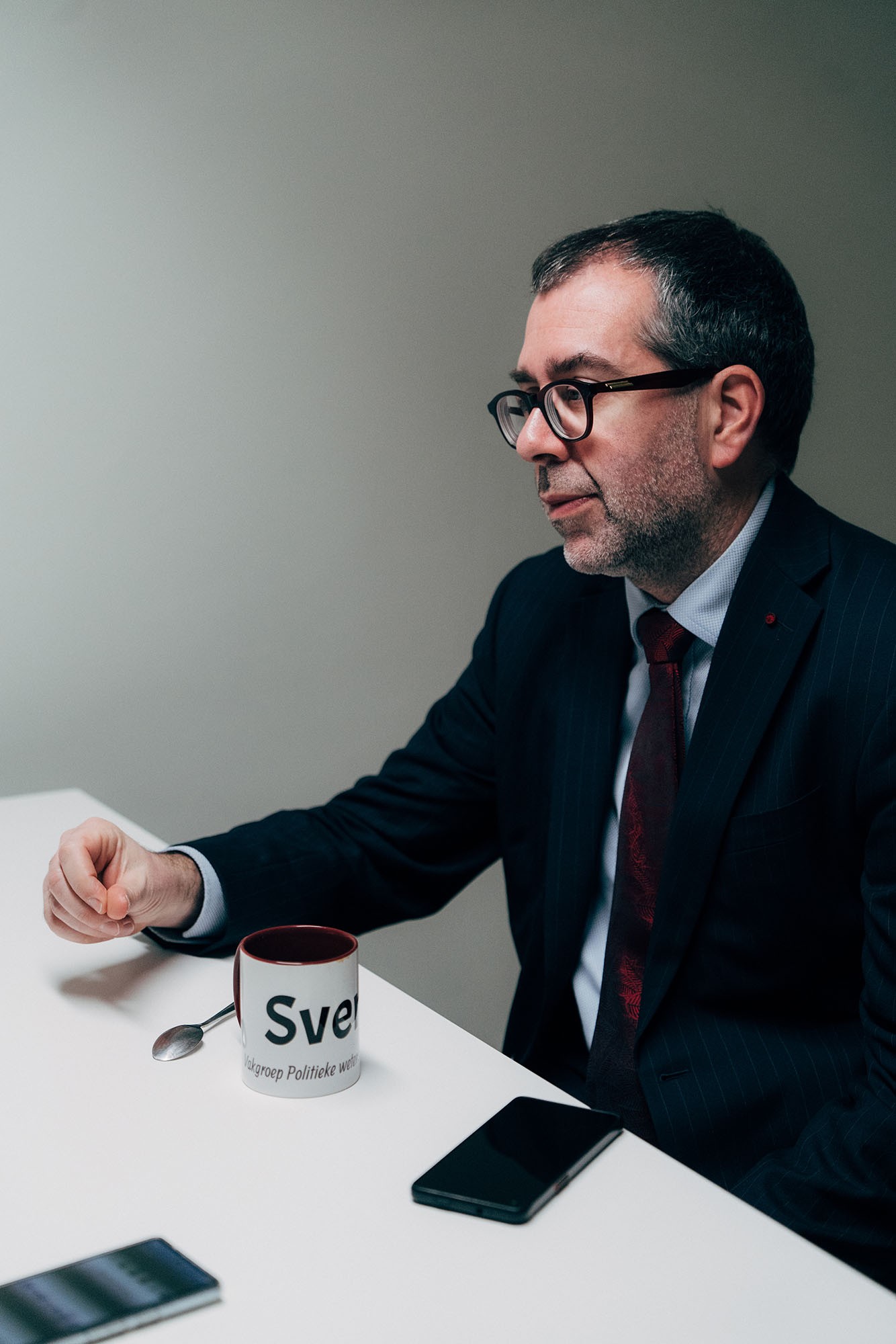In 2024, will we find a solution to the world’s many conflicts or can we expect more wars? And what role should Europe play? We put these questions to international politics expert Sven Biscop.
“The situation today is not so exceptional, it is how we see it. The 1990s were a decade of many wars: you had the first Gulf War, the genocide in Rwanda, the war in the former Yugoslavia, the first Intifada, the civil war in Algeria, ... The difference with today was the optimism of the West at the time. We had just come out of the Cold War and believed we could solve all sorts of conflicts. Today there is more pessimism, so wars and conflicts weigh more heavily.”
Nevertheless, Professor Biscop points out that war has always been part of history, which gives him hope. "If we were able to end wars and conflicts in the past, we must find solutions today too. But they will not come out of the blue."
Seen from this perspective, the question today is whether there is sufficient political will to intervene. Professor Biscop believes this is not entirely justified. “When Russia invaded Ukraine, there was a huge and immediate backlash. We didn't just let the Russians go ahead. Ukraine is able to fight on because of the West's support, otherwise it would have been defeated a long time ago.”
Sustained support for Ukraine
Nearly two years on, war weariness seems to be setting in in the West, and the funding and supply of arms is increasingly under fire. Not a good thing, he says. “It is very important for European security and stability that we stop Russia. We must persevere and send a clear message that we will continue to offer support for years if necessary. Until Russia understands that it cannot win and that it must negotiate.” And if the support stops? “Then the country will be occupied by Russia.”
Biscop expects Europe's role as an ally to grow in the coming period. “I expect US support to decrease in the coming years. What the Americans are doing less of, we Europeans will have to do more of. In Ukraine, in Israel, in other conflicts where the US currently plays a leading diplomatic role. That is why I find it incomprehensible that almost two years after the invasion, Europe still has no long-term plan for military support for, say, the next five years. This puts us behind Russia, which has now switched to a war economy. So we are not doing well.”
Europe's bodyguard
An integrated European defence policy is still a long way off. But that does not mean Europe should fear a direct attack from Russia. NATO will never let that happen, says Sven Biscop. “Without NATO, I would not feel so comfortable. When Russia threatened nuclear weapons two days after its invasion of Ukraine, NATO replied very calmly that it had them too. End of nuclear threat. NATO has an important deterrent role. So we don't have to fear a direct counter-attack from Russia.”
Gaza: how can we break the vicious circle?
If the EU reacted immediately to the invasion of Ukraine, the lack of unanimity over the war in Gaza is all the more striking. Professor Biscop finds this surprising. “Before 7 October, the EU line was clear: we are against terror and for a two-state solution. But suddenly a number of member states – with Belgium as one of the exceptions – think they have to choose between the two. This has created the impression that we are unconditionally behind Israel and that has cost us a lot of creditability in many countries. However, the former EEC was the first to recognise the PLO as a legitimate interlocutor.”

"Als we vroeger een einde konden maken aan oorlogen en conflicten, dan moeten we ook vandaag oplossingen vinden. Maar die komen niet uit de lucht vallen."
The US has little influence on Israel's war effort. “The Americans are actively pursuing a policy to limit escalation in the region; the EU should support this strategy. I think – very conditionally – that the US believes there is a small chance that we can finally break the vicious cycle of violence after the war. Provided that the Israeli army does not continue to occupy Gaza and that it does not return to Hamas control. The next step could be a major international initiative to finally achieve the two-state solution. There is also an important role for the EU to act as a unifying force in the region and keep up the pressure.”
But for now, this is a distant dream that can only be set in motion when the war ends. How and when that will happen is anyone's guess. “We don't know how long Israel plans to stay in Gaza. They can nuke everything there, but that doesn't destroy an ideology. I think the pressure to end the war will have to come from the Israeli people themselves. Before 7 October, Netanyahu was very controversial at home. Many Israelis, I think, see the war as a political failure. If this internal pressure becomes too great, hopefully the war will end soon.”
Disinformation and cyber-attacks
Wars today are not only being fought on the battlefield, cyber violence is also increasing online in the form of hacking, cyber-attacks, fake news and disinformation. Sven Biscop nuances: “I never talk about cyberwar, because you have to keep distinguishing between peace and war. Sometimes you hear people say that we are already at war with Russia – digitally – but that is not true. Because then our country would be a military target for Russia, and vice versa.”
Cyber-attacks or the spread of disinformation via social media also happens in peacetime and it will be no different in 2024. European elections are coming up, the Americans will elect a new president... should we passively accept such attacks? “According to NATO, such a non-military action can be considered an act of war if the impact is so great that it threatens stability. NATO says it can go to a state of war at such a time. Again, you can interpret their view as a form of deterrence that says ‘don't push it too far’.”
Should we fear the impact of disinformation or fake news in a polarising world? “Spreading disinformation from outside only works if there are already internal divisions. So in order not to go too far, as a country you have to address those internal vulnerabilities through your domestic policies. Perhaps in the run-up to the storming of the Capitol, Russia may have massively spread disinformation among Trump supporters. But without a Trump, the storming would never have happened. The greatest threat to your survival as a country is often to be found internally.”
Working together in a multi-polar world
The world has changed, there are no longer two world economies but one globalised world economy. It plays an important role in achieving the goal of international politics, which is peace and stability. “The four major powers today are the US, Europe, Russia and China. They are each other's competitors, but often also each other's partners in ever-changing constellations. Other countries are also ‘hedging’: they do not want to be tied exclusively to one superpower, but maintain a working relationship with each. This multipolar world is a good thing for an export economy like Europe."
Tense US-China relations do not rule out a new bipolar Cold War. “There are enough grounds for conflict out there: think of Taiwan, the South China Sea... Europe has absolutely no interest in that. So our job is to hold the world together, by investing in the universal multilateral institutions that make the world work. Think of the UN, the World Bank, the WHO, the IMF. It would be a good thing if this multipolar world were better reflected in these institutions. The head of the World Bank is always an American, that of the IMF a European. That is out of date. You could make the UN much more representative and balanced by putting emerging countries at the top of the institutions. Reforming the Security Council is much more difficult because the five permanent members have a veto.”
What will 2024 bring?
As hopeless as the situation in many conflicts looks or feels today, that should not stop us from remaining hopeful, he believes. “You have to be optimistic and not be complacent. Europe is a prosperous continent and if we want to keep it that way, we have to act and not wait and see. It is easy to predict war, nobody predicts peace. You have to make it happen. We will get nowhere with doomsday scenarios. How can the EU achieve this? Mainly by maintaining an open economic, political and security policy. And what about Ukraine? Persevere!”
